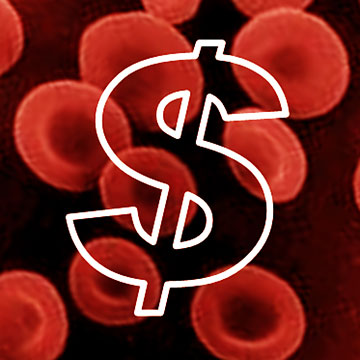Money: the red blood cells of economic circulatory system
COFFEE WITH WARREN, with Warren Harbeck
Cochrane Eagle, November 2, 2011

Money no more exists for its own sake than red blood cells exist for their own sake. Both exist to serve something greater than themselves. Graphic by Warren Harbeck
Suppose that some part of our body decides to amass all the blood cells it could possibly get hold of. It piles up more and more of our circulatory system’s tiny travellers to form a blood clot.
Or suppose we experience a severe cut to our body, and more and more of our blood drains away.
Or that we develop some bone marrow disease that significantly reduces our body’s usual production of 500 billion blood cells per day.
Now, I’m no medical expert, but common sense tells me that none of these three possibilities is especially good for our health.
I mean – and here, I’m thinking of red cells in particular – our blood exists to serve the well-being of our body as a whole: to take, for example, life-sustaining oxygen from our lungs to all other parts of our body.
In the case of the blood clot, we may suffer a heart attack, stroke or other nasty thing because the red blood cells have been taken out of circulation, depriving some vital organ or another of oxygen.
In the case of uncontrolled bleeding, red blood cells have also been taken out of circulation, this time depriving the entire body of the oxygen it requires to stay alive.
In the case of the bone marrow’s inability to generate enough blood cells, the rest of our body suffers, not because something has kept the blood cells from circulating, and not because they’ve been drained off, but because they were never produced in the first place.
Now, as I said, I’m no medical expert. I’m also not an economist. But when I look around at the problems in our global economy today, common sense tells me that I have something to learn from our body’s circulatory system.
Blood clots? Hoarding of wealth. Greed.
Bleeding? Taking money off shore or hiding it under a mattress.
In both cases, that which is necessary for the overall material well-being of the many is taken out of circulation for the benefit of the few – or to no one’s benefit at all!
So, is the solution to such economic imbalance to be found in undermining the very enterprises that generate wealth in the first place? That’s what some of the placards being waved in the air at Occupy Wall Street encampments lately would seem to suggest.
That makes about as much sense to me as trying to cure someone with anemia (deficiency in red blood cells) by removing their bone marrow and replacing it with . . . nothing!
The point is that, just as every organ in our entire body needs the oxygen supplied to it by red blood cells in a fully functional circulatory system for our body as a whole to experience good health, so too with our global economy.
Money, like blood, must keep circulating to do its job.
When one part suffers unjustly, it affects the well-being of all. And conversely, when the system as a whole functions justly, all its parts have the opportunity to function well, too.
Several bits of wisdom come to mind that speak to this. One popular saying goes: “There’s enough for everyone’s need, but not for everyone’s greed.”
Another appears in Edmonton author Mark Anielski’s book, The Economics of Happiness. It’s a quotation from the 19th century philosopher John Ruskin:
“There is no wealth but life. Life, including all its powers of love, of joy, and of admiration. That country is richest which nourishes the greatest number of noble and happy human beings; that man is richest who, having perfected the functions of his own life to the utmost, has also the widest helpful influence, both personal, and by means of his possessions, over the lives of others.”
I’ll close with this word which, according to the Hebrew prophet Jeremiah, God spoke to the people of Jerusalem as they were being led off into captivity in Babylon in the sixth century B.C. (Jeremiah 29:7):
“Seek the well-being/prosperity of the city where I have sent you into exile, and pray to the Lord on its behalf, for in its well-being you will find your well-being.”
© 2011 Warren Harbeck
JoinMe@coffeewithwarren.com